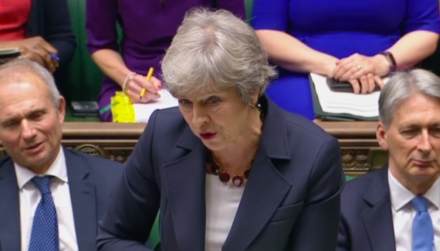
It lasted just 11 minutes this week, but felt a whole lot longer. In one of the worst PMQs yet, Theresa May batted away every question put to her with the lines we have had the misfortune of hearing hundreds of times before: nothing is agreed until everything is agreed; we have made good progress; we’re working to get the best deal for the country; we want frictionless trade across our borders; we’ll deliver on the vote of the British people and protect jobs; yadda yadda yadda.
Each statement was prefixed with something like “we want”, “we are clear” or “as I said to the House on …”, as they were largely empty promises and wishful thinking rather than declarations of fact. If a fact was involved, it couldn’t be any more exciting than, say, repeating the government’s opposition to another Brexit referendum. Such an answer naturally had little to do with Jeremy Corbyn’s question as the Labour leader himself doesn’t support a ‘people’s vote’ and therefore – quite sensibly – wouldn’t raise the issue.
Apparently MPs could predict the particularly tiresome charade awaiting us. The chamber was just half-full, with stretches of green benches left empty. Chris Bryant tweeted: “I’ve never known #PMQs have so many empty seats.” Mike Gapes said he arrived late but had no trouble finding a seat. Others attended but were clearly distracted.
Jeremy Corbyn got a few zingers in, with a notable reference to the ‘pizza summit‘ held by Tory cabinet rebels to discuss how badly Brexit is going. When striking a more serious note, the Labour leader pointed out that the NHS is “woefully unprepared” for an ever more likely no deal outcome. He repeatedly began follow-ups with “the question was…” because, of course, the Prime Minister failed to answer any. We certainly didn’t learn anything from this exercise. Today was a strong case study for the argument in favour of scrapping PMQs.




More from LabourList
Letters to the Editor – week ending 15th February 2026
‘Labour council candidates – it’s tough, but all is not lost’
‘Labour won’t stop the far right by changing leaders — only by proving what the left can deliver’